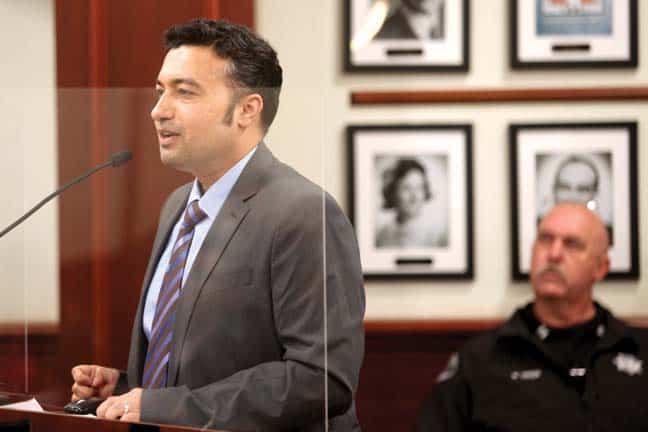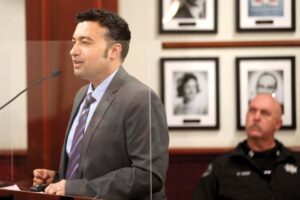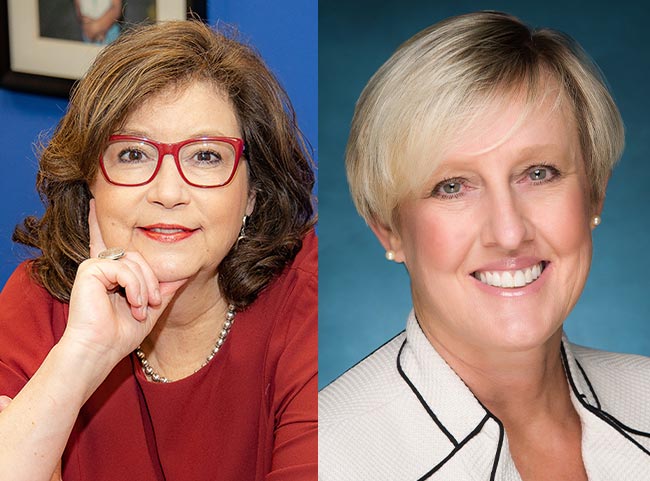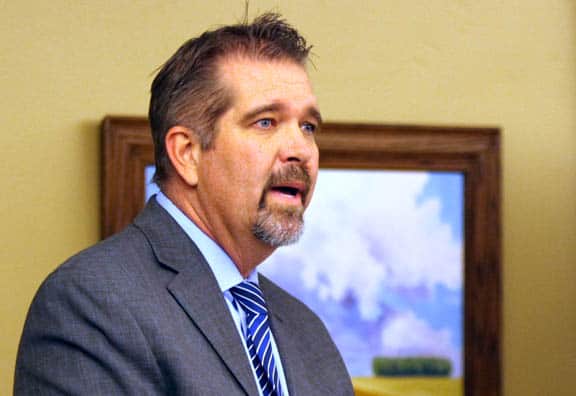City reports small surplus; will hire police officer

Finance director Nishil Bali made a presentation on the midyear status of Claremont’s budget at Tuesday’s City Council meeting. He said it shows a modest surplus. Courier photo/Steven Felschundneff
by Steven Felschundneff | steven@claremont-courier.com
Thanks to an increase in property and sales tax revenues, the city’s finance department reported a small budget surplus during Tuesday’s Claremont City Council meeting, which the Council elected to spend on hiring a police officer.
The new officer will address commercial and residential burglaries, and criminal activity around the motels near the 10 Freeway, according to a staff report.
The hiring was met with approval from residents who spoke during public comment.
Police Chief Aaron Fate said the department has yet to decided whether to hire a detective or a patrol officer. If they choose to go with a new recruit, he or she would have to attend the police academy and additional training, so it will be about a year before the new officer would hit the streets.
“The proposed additional position is consistent with the City Council Priorities, which call for staff to be proactive in addressing criminal activity along the I-10 Freeway and conducting traffic enforcement to improve the safety of City streets,” according to a staff report.
The position will cost $43,000 for the remainder of the fiscal year and an additional $184,000 for 2023-24, which funds the position through June 2024.
The recommendation to hire an officer was part of Finance Director Nishil Bali’s midyear city budget update, which he says is on track to meet expectations.

Finance director Nishil Bali made a presentation on the midyear status of Claremont’s budget at Tuesday’s City Council meeting. He said it shows a modest surplus. Courier photo/Steven Felschundneff
“Through the first half of the year, City funds are generally performing within expected 2022-2023 budgeted levels,” Bali wrote in the staff report. “The City has received sufficient revenues to suggest that full-year budgetary estimates are realistic and that the City is on track to meet or exceed those full-year projections.”
In June, the council adopted its operating and capital improvement budget for the next two fiscal years, including $62,932,953 in revenues and transfers in from other funds, and $62,811,560 in expenditures and transfers out for the current fiscal year. That budget aimed to maintain current levels of community services while continuing to pay down its deficit to employee pensions, and set aside additional funds for the city’s operating and environmental emergency reserve.
Bali’s report showed expenditures and revenue through December 31, 2022 were on target. His staff expects the second half of the fiscal year to be a similar story.
Since the initial estimate in June, revenues are expected to be slightly higher at $63,119,577, with expenditures now at $77,087,487. While at first glance that appears to be a widely out of balance budget, the additional expenditures are carryovers from the previous year and reflect projects funded by state and federal gas taxes as well as money from measures M and R.
“The budget for the Special Revenue Funds was increased from the original adopted
budget of $14,913,276 to $21,587,164 due to carryovers for contributions related to unspent capital project budgets from prior fiscal year,” according to Bali’s report. This part of the capital budget rolls over every year around August and unspent revenue from the previous year is reflected in the mid-year budget update.
These capital projects include resurfacing nonresidential streets, signalized intersection upgrades and accessibility improvements, and pedestrian and bike infrastructure upgrades.
The general fund is the largest chunk of the budget both for money coming in and going out. As of the first of the year, the city has received $11,190,179 or 36.51% of the total adjusted general fund revenues for the fiscal year.
The city’s largest source of general fund money comes from property taxes, of which $2,542,030 or 22.11% has been received so far. The county typically remits property tax to the city in three payments, only one of which happens by midyear, so it’s customary to only get about a fifth of the yearly total at this point. Despite that, the city has received $211,285, or 9% more property taxes than it had at the midpoint last year, according to Bali’s report.
The second biggest piece of the pie is sales tax, of which the city has received $2,725,425, or 37.96% of the anticipated total. This represents less than six months’ worth of collections due to a lag in receiving the revenue from the county, but is still $200,258, or 7.8%, more than last year at this time. The additional funds are due to strong auto sales and the ever-increasing number of people buying products online.
Business license taxes were significantly lower this year, but for a very good reason: the council authorized a fee rebate for the year, which was paid through a portion of the American Rescue Plan Act. Transit occupancy taxes were also down, due in part to lower occupancy rates at the motels near the 10 Freeway.
General fund expenditures are projected to be slightly higher at $31,773,250, again because of carryovers related to projects that were not completed in the prior year. The city has spent $16,858,767, or 53% of its budget, as of the first of the year.
“Given that one would reasonably expect 50% of the budget to have been expended at this point in the fiscal year, results to date show that the City should remain within budgetary constraints,” read the staff report. “Staff will review General Fund expenditures in the third quarter of this fiscal year to recommend budget adjustments, if necessary.”
General services was at 104% of its adjusted yearly budget due to $3.1 million paid in July to cover the city’s annual general liability, workers’ compensation, and property insurance deposits for the year.
Bali said the revenues from user utility taxes had increased by 5.87% over last year, primarily because gas and electricity rates have gone up. This revelation prompted council members Corey Calaycay and Jed Leano to ask whether the city could rebate some of that money, given the budget surplus and the unusually high natural gas bills many residents have received this month.
City Manager Adam Pirrie responded that he would ask somebody on his staff to assess the options in creating such a program and present it to the council at a future meeting. He also noted the city has an existing program for low income residents that exempts them from the utility tax and also provides a discount on their city services bill.









0 Comments